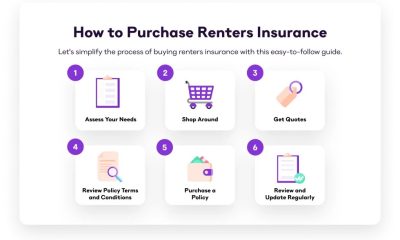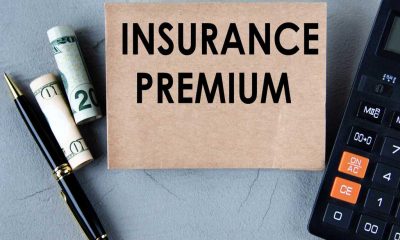Insurance
Best Small Business Insurance Companies 2024

As a small business owner, you need insurance to cover your company’s possible risks from fire, theft, lawsuits, and much more. After conducting comprehensive research, our experts determined that Next is the finest business insurance provider overall because it provides a diverse choice of policy types and a quick online application process that allows you to sign up in around 10 minutes.
To select the best commercial insurance carriers for small businesses, we compared 19 national and regional insurers based on 53 criteria including pricing, quotation and application experience, customer happiness, coverage, accessibility, and financial stability.
Best Small Business Insurance Companies for March 2024
- Best Overall: Next
- Best for Independent Contractors: Hiscox
- Best Restaurant Insurance: Huckleberry
- Best for Financial Stability: biBERK
- Best Budget Coverage: Thimble
- Best Workers’ Compensation Insurance: The Hartford
- Best for Larger Small Businesses: Chubb
- Highest Customer Satisfaction: State Farm
Next
Why We Chose It
Next offers a way to obtain a large choice of affordable business insurance coverages fully online in approximately 10 minutes. However, you can also speak with a local U.S.-based advisor.
Pros
- Offers a live certificate of insurance for easy sharing
- Allows you to customize your business insurance policy with a variety of coverages
- 100% online quote and application with assistance available
Cons
- Fewer specialized coverages than some other companies
Next sells a variety of commercial insurance coverage online for same-day coverage. Next provides business owner’s policies (general liability and commercial property), commercial auto, workers’ compensation, professional liability, tools & equipment, and more.
Other digital policy management capabilities from the company include the ability to share a live certificate of insurance and rapidly add an insured for free. Customers can pay monthly and save 25% with discounts.
AM Best rates Next Insurance as A- (Excellent) financially. Other companies offer cyber liability insurance and other upgrades. Next, created in 2016 in Palo Alto, California, simplifies insurance purchase with AI and machine learning. According to Crunchbase, it raised $265 million from Allstate and Allianz X in November 2023, one of the largest insuretech fundraising rounds that year. These include a strategic agreement with Allstate to provide new commercial auto insurance solutions.e
Hiscox
Why We Chose It
Our top small commercial insurance supplier for independent contractor insurance is Hiscox, which offers many freelancer alternatives.
Pros
- Customization options for independent contractors
- Monthly payments with no fees
- Offers short-term liability insurance for business
- 100% online quote and application with assistance available
Cons
- Higher than expected number of complaints with the NAIC
Hiscox offers a simple BOP with business interruption, electronic data loss, professional liability, and other options.
Individual professional liability and general liability policies can be purchased on demand for short-term assignments. Hiscox also lets freelancers pay for business insurance monthly, which helps with cash flow.
AM Best rates Hiscox A (Excellent), indicating strong financial soundness, however the company got more complaints than expected over the last three years considering its size. 4 5 NAIC. “Hiscox Insurance, Inc.”
Hiscox may have customer satisfaction difficulties, but the company received less complaints each year, showing improvement. Around $500 per year, BOPs begin.
Find a business insurance quote online or call an agent. You can file claims online or by phone. Online claims services are available 24/7. Hiscox USA, situated in Atlanta, was founded in 1901. It is part of the Hiscox Group, a global firm with about 3.000 people.
Huckleberry
Why We Chose It
Pros
- BOP policies underwritten by Markel and Chubb
- 100% online quote and application
- Wide range of customization options
Cons
- Doesn’t offer employee benefits packages
In addition to its business owner’s insurance, Huckleberry, a Chubb and Markel BOP broker, offers a restaurant endorsement. It covers spoilage, food contamination, and ordinance or legal equipment coverage, among others. You can also tailor your company insurance policy with workers’ comp, commercial car, and liquor liability coverage.
Markel or Chubb underwrite most policies. AM Best gives both companies high financial strength ratings.
Huckleberry, like Next Insurance, offers a quick online quotation and application for small business coverage. You may get an online insurance certificate in minutes to share with clients.
Huckleberry’s BOP offers affordable general liability, commercial property, and business interruption insurance. A food truck BOP costs $42 each month. Paychex Insurance Agency owns Huckleberry, a 2017 San Francisco startup.
biBERK
Why We Chose It
AM Best has given biBERK an A++ (Superior) financial strength rating, the highest grade available, and it offers a wide range of industry-specific coverages. Berkshire Hathaway is also backing it.
Best at 8 a.m. “AM Best Affirms Credit Ratings of Berkshire Hathaway Homestate Insurance Company and Its Affiliates.”
Pros
Backed by Berkshire Hathaway Group
- Online quote and application
- Excellent customer service reviews
- Dozens of endorsements to enhance a BOP
Cons
- Doesn’t offer group employee benefits
biBERK Business Insurance is a division of Berkshire Hathaway Group, which has decades of experience in the commercial insurance business. AM Best has rated all of BiBerk’s underwriters A++ (high), indicating a high capacity to meet financial obligations to policyholders.
Furthermore, you may acquire a quote and apply for coverage promptly, all online. Policyholders have positive things to say about the service and coverage on third-party websites such as Trustpilot, where it has an average rating of 4.2 stars. BiBERK can satisfy the needs of most small businesses by providing a variety of commercial insurance choices, including business owner’s policies, commercial auto insurance, workers’ compensation insurance, umbrella insurance, professional liability insurance, and general liability plans.
You can include risk-specific and industry endorsements in your business owner’s policy, such as liquor liability and cyber liability coverage. BiBerk BOPs start about $500 per year. BiBerk was created in 2015 and is headquartered in Omaha, Nebraska.
Thimble
Why We Chose It
Thimble offers on-demand policies for general liability insurance starting at $17 per month.
Pros
- Offers monthly and on-demand coverage options
- Liability policies start at $17 per month
- Offers event insurance
- Occurrence-based policies
- Excellent reviews on Trustpilot
Cons
- Doesn’t offer commercial auto insurance
Thimble is an excellent choice for small businesses seeking rapid, temporary, and economical small business insurance, particularly those wishing to obtain coverage for an event or on an as-needed basis. The company’s business owner’s policy covers general liability, commercial property insurance, and business interruption insurance, with the option to add professional liability, workers’ compensation, and business equipment protection.
Customers on Trustpilot had positive things to say about the application procedure. You can obtain a quote and purchase coverage online or through the app. Several reviews also mentioned that Thimble’s customer service personnel was communicative and responsive.
Thimble works with a variety of insurance companies, all of which have an AM Best rating of at least A- (Excellent).
Thimble plans offer greater coverage than claims-made policies due to their occurrence-based approach. Even if you have terminated your business insurance coverage, you are still protected for occurrences that occurred while it was in place. Thimble, which had been supplying small business insurance since 2018, was acquired by Arch Insurance in April 2023. Thimble is headquartered in New York City.
The Hartford
Why We Chose It
The Hartford has been around since 1810 and is one of the nation’s top suppliers of workers’ compensation insurance.
Pros
- Pay-as-you-go billing options
- Access to a network of over 1 million providers
- 2nd-highest financial strength rating
- Start claims online
Cons
- Poor J.D. Power ranking
Hartford workers’ compensation insurance is a preferred choice for small businesses. The company offers pay-as-you-go billing and a large network of doctors and nurse case managers to assist your staff become well.
Paying as you go eliminates overpayment by basing premiums on actual payroll rather than estimations. The Hartford enables easy online claim filing. The startup gives wounded workers a toolkit to rehabilitate faster using data analytics.
The J.D. Power 2023 U.S. Small Commercial Insurance Study put the insurer below average, despite AM Best’s A+ (Superior) financial strength rating. The Hartford, Connecticut-based Harford was created in 1810.
Chubb
Why We Chose It
Chubb is appropriate for larger small businesses because it protects companies with revenues of up to $30 million and provides a diverse variety of coverage options.
Pros
- Supports businesses with up to $30 million in revenue
- Few complaints relative to Chubb’s market share
- Highest financial strength rating
- Many enhancements to customize a BOP
Cons
- Must speak with an insurance agent to start your business insurance policy
Chubb is one of the largest commercial insurance carriers (by yearly premiums) and offers a popular small business owner’s coverage. The company has relatively high revenue limitations for its small commercial business owner plans and provides a wide range of tailored endorsements for a variety of sectors.
You can supplement your company owner’s policy with electronic data liability coverage, professional liability insurance, a number of property add-ons, criminal coverage, equipment breakdown coverage, earthquake coverage (in some areas), and more. Workers’ compensation, umbrella, commercial vehicle, and cyber risk coverage are all available.
Chubb can provide an instant estimate, and policies are generated immediately, but you must speak with an insurance agent to begin your coverage.
AM Best rates Chubb’s financial strength as A++ (Superior), and it ranks second in customer satisfaction in the J.D. Power 2023 U.S. Small Commercial Insurance Study. Chubb Corporation was founded in 1882. Chubb Insurance Group is currently situated in Warren, New Jersey.
State Farm
Why We Chose It
State Farm is one of the top-ranked firms for customer satisfaction in the J.D. Power 2023 U.S. Small Commercial Insurance Study, and it provides coverage for almost every industry.
Pros
- Highest financial strength rating
- Customizable business owner’s policies with many coverage options
Cons
- Must speak with an insurance agent to start your business insurance policy
State Farm has been fulfilling the needs of small companies since 1935 and has received high reviews. The organization has an A++ (good) financial strength grade from AM Best, indicating a good ability to pay claims.
It also placed second in the J.D. Power 2023 U.S. Small Commercial Insurance Study. According to NAIC data, State Farm had slightly less complaints than expected for their commercial liability coverage. However, you will need to speak with an insurance representative to obtain coverage. Some business owners may prefer to do the entire procedure online.
The company’s BOP includes commercial property and general liability insurance, as well as loss of income, equipment breakdown, and money and securities protection, all at no additional cost.
You can also add professional responsibility to the package. You can also purchase commercial auto insurance, workers’ compensation insurance, and a variety of other coverage options. You can also collaborate with State Farm to offer benefits to your employees, such as group life, disability, and health insurance. State Farm was formed in Bloomington, Illinois, in 1922.
Compare the Best Small Business Insurance Providers
| Company | Best for | AM Best Rating | BOP Revenue Limit | Buy & Receive Policy Online? |
| Next | Business Insurance Overall | A- | $8 million | Yes |
| Hiscox | Independent Contractors | A | $5 million | Yes |
| Huckleberry | Restaurants | A++, A* | None | Yes |
| BiBerk | Financial Stability | A++ | None | Yes |
| Thimble | Budget Coverage | A- through A+** | Not disclosed | Yes |
| The Hartford | Workers’ Comp | A+ | $50 million | No |
| Chubb | Larger Small Businesses | A++ | $30 million | No |
| State Farm | Customer Satisfaction | A++ | Not disclosed | No |
Our Expert Picks for Small Business Insurance in Any State
Small business size may determine the type and best insurance company for you. Compare Next, Huckleberry, and BiBerk for cheap BOPs and fast online coverage. Hiscox and Thimble serve independent contractors and event workers well. Worried about workers’ comp? Consider The Hartford and BiBerk. For comprehensive coverage and employee benefits, State Farm and Chubb are excellent.
Your sector may require specialist coverage that a normal business owner’s policy doesn’t provide. Some companies offer more upgrades. Choose a supplier that protects your firm from industry hazards when refining your alternatives.
What Is Small Business Insurance?
Business insurance, often known as commercial insurance, protects your assets and revenue from lawsuits, natural catastrophes, and accidents. Small businesses have several insurance options, including property damage, legal responsibility, and personnel hazards. BOPs cover general liability, business property, and business interruption. Consider adding business car, errors and omissions, and key employee coverage.
What Types of Small Business Insurance Are There?
| Type | Who Needs It | When It Protects You |
| General liability | Any business | If consumers, vendors, or other people outside your company claim your business harmed them or their property |
| Commercial property | Businesses that own or rent a property, or have equipment or records to protect | If a natural disaster harms your property or a thief steals your property |
| Business income | Any business that depends on its property to generate income | If your business loses revenue because your property is damaged |
| Professional liability | Lawyers, doctors, accounts, and others who provide services based on specialized expertise | If a customer accuses you of negligence, malpractice, mistakes, or misrepresentation |
| Workers’ Compensation | Businesses with employees. Most states require it | If a worker is injured on the job |
| Employment practices liability | Businesses with employees | If a worker alleges discrimination, harassment, wrongful termination, or other unfair employment practices |
| Product liability | Businesses that sell products | If someone claims your defective product caused bodily harm or injuries |
| Commercial auto | Businesses that use vehicles for operations or business owners who use their personal car for business | If you or an employee are in a car accident while working or using a company car |
| Commercial umbrella | Businesses with high liability risks like lots of foot traffic, and those that could be hit with very expensive lawsuits. Often required for government contracts | If a big unexpected event happens that causes damages beyond what your other insurance covers |
| Cyber liability | Businesses that virtually interact with customers and accept electronic payments | If your business is hacked or suffers a data breach |
Pros and Cons of Small Business Insurance
Pros of Small Business Insurance
- Protects company assets: Business insurance protects your company’s financial assets from losses resulting from damage to your property or third-party negligence claims.
- Safeguards employees: Workers’ compensation insurance pays the cost of medical treatment and lost wages for workers injured on the job.
- Fulfills legal or contractual obligations: State laws may require you to buy workers’ compensation, auto liability, or other types of insurance. Likewise, contracts you sign may require you to buy specific kinds of insurance, such as general liability or auto liability insurance.
- May boost the company’s reputation: When your business is insured, it’s a sign to customers and business associates know that you care about your company and managing its risks
Cons of Small Business Insurance
- Cost: Business insurance premiums can be a significant expense, especially for a small company.
- Exclusions, limitations, and availability issues: All insurance policies exclude or restrict coverage for some risks. Insurers may refuse to cover some risks you want to insure or they may limit coverage you feel you need.
- Documentation requirements: Whether you’re applying for new insurance or filing a claim under an existing policy, you must comply with the insurer’s documentation requirements. Some insurers’ requirements can be cumbersome.
- Adjustment and payment delays: Once you’ve suffered a loss, you must file a claim and wait for an adjuster to assess the damage before making repairs. If the adjuster is slow to respond, repairs and claims payments may be delayed.
How Much Does Small Business Insurance Cost?
Business insurance, often known as commercial insurance, protects your assets and revenue from lawsuits, natural catastrophes, and accidents. Small businesses have several insurance options, including property damage, legal responsibility, and personnel hazards. BOPs cover general liability, business property, and business interruption. Consider adding business car, errors and omissions, and key employee coverage.
| Type of Coverage | Lowest Cost (per year) |
|---|---|
| Business Owner’s Policy (BOP) | $300 to $500 |
| Professional Liability | $300 to $500 |
| General Liability | $200 to $381 |
The price of a commercial insurance policy depends on several factors:
- Industry or profession: The type of business you have impacts your amount of risk. A construction company, garage, or restaurant will have many more liability risks than a retail store or office, for instance. Also, your business type may be required by law to have certain types of coverage.
- Business location: Businesses in high-crime areas or places prone to natural disasters will likely pay more for commercial property insurance than those in low-risk areas. State regulations and whether you rent or own your space also help determine your costs.
- Claims history: If you have a history of claims in the past, insurers may consider you a higher risk and charge you more.
- Number of employees and customers: The cost of workers’ compensation insurance is based on the number of workers your business employs. Also, if you have a large customer base, that exposes your business to more liability and property risks.
- Coverage needs: Choosing higher annual aggregate liability limits will increase your premiums, as will choosing a $0 deductible for your property insurance.
How Do I Know If I Need Small Business Insurance?
Your business’s size, operations, and state laws determine whether it needs insurance. The majority of businesses need general liability insurance to cover third-party physical injury and property damage. Consider liability insurance if you make or sell products, invite customers to your premises, or provide services at clients’ locations.
Consider property insurance if your business has buildings or other property used in operations. Commercial property insurance protects your business from fires and other covered perils. It may also cover physical damage-related revenue loss.
Does your business use automobiles or trucks? State law may demand auto liability insurance. You’ll need business auto insurance for the automobiles. State legislation may demand workers’ compensation insurance for employers. If your business provides advise or professional services, consider professional liability insurance. Professional liability insurance, often known as errors and omissions insurance, protects your organization from third-party claims for financial losses caused by malpractice, faults, or blunders in professional services.
Small business insurance may seem expensive, but a huge lawsuit might cost more. Consider those hazards while evaluating if you need coverage.
- Small-Business Insurance News
Most small firms carry general liability insurance, but other types of insurance are less popular, according to a Hiscox poll. The company stated that 75% of respondents were underinsured. The 2023 Hiscox Underinsurance in Small Business Report polled 1,000 small enterprises and discovered that:
- 65% had general liability coverage
- 45% had property insurance
- 35% had workers’ compensation insurance
- 32% had professional liability insurance
Of those who had insurance, 68% indicated they purchased it because they were concerned about the implications of a claim. Only 20% claimed they received it because a partner or vendor required it.
- How to Choose a Small Business Insurance Company
Here’s a step-by-step process for choosing the best insurance company for your small business:
- Ask trusted colleagues, business associates, or other business owners for recommendations.
- Check online reviews of business insurers. This list is a good start, but check out reviews from several sources and compare the results. Look for insurers that rate highly in several reviews.
- Consider market share rankings from sources like the National Association of Insurance Commissioners. While large insurers aren’t necessarily better, most have a long track record and are financially stable.
- Review J.D.Power’s customer satisfaction rankings of small business insurers.
- Consider your preferred method of buying insurance. Do you want to buy a policy directly from an insurer or through an agent? Do you prefer buying insurance online or in person?
- Once you have some insurers in mind, evaluate their financial strength by reviewing data from rating agencies such as AM Best and Moody’s Investors Services.
- Get quotes from the insurers you’ve selected (or their representative agents) and compare the results. When deciding between insurers, consider the coverages, limits, deductibles, and other features each offers, not just the price.
FAQs
- Is Business Insurance Required?
Business insurance is optional unless required by state law or contract. Many states mandate workers’ compensation or auto liability insurance if your firm owns commercial vehicles. Your business contract may demand insurance. Imagine running an electrical contracting firm. A general contractor hires you to install electrical panels in a building. Before starting work, the contract requires general liability, car liability, and workers’ compensation insurance.
- What Does Small Business Insurance Cover?
Business owners usually have general liability, commercial property, and business interruption insurance. Business general liability insurance covers lawsuits for hurting other parties. Your commercial property insurance covers building damage. After an insured loss, business interruption insurance replaces income.
- What Does Small Business Insurance Exclude?
Everything not specifically covered by small business insurance is excluded. If your business owner’s policy doesn’t cover business personal property, you won’t be covered for office or warehouse assets following a loss. Not all calamities are covered. Covering earthquakes and flooding requires an endorsement. Non-covered catastrophic events include war. Commercial plans won’t cover losses covered by other policies.
- What Is the Average Cost of Small Business Insurance?
Our study shows the lowest yearly small business insurance rate is $300 for a business owner’s policy. General liability and commercial property coverage are included. However, your small business insurance price will depend on the coverages you choose and their limits, what you sell and how much you earn, your location, and whether you rent or own.
- Do I Need Small Business Insurance If I Work From Home?
Home-based businesses may need business insurance. Your homeowners policy may not cover your business equipment, inventory, or data, therefore you may need business property insurance. Liability insurance is also needed if you’re sued for product, service, or advisory damages. Business interruption insurance may cover natural catastrophe, theft, and equipment failure damages. Finally, employers’ liability insurance may cover remote workers who are hurt, sick, or die on the job.
- Do I Need Small Business Insurance If I Have an LLC?
LLCs require business insurance to defend against lawsuits and property losses. Your personal assets are protected against LLC litigation, but not the LLC itself. Imagine a customer sues your LLC for injuries at your firm. No liability insurance means your firm must pay legal fees and court judgments or settlements.
If your LLC owns fire-damaged buildings, equipment, or other property, it may potentially lose property. Your LLC must pay repairs with corporate assets. General liability and commercial property insurance can safeguard your LLC against unforeseen losses.
- Is Small Business Insurance Tax-Deductible?
If “ordinary and necessary” for your business, small business insurance premiums are tax-deductible. This comprises liability, commercial property, malpractice, workers’ compensation (where needed by law), commercial vehicle, business interruption, and overhead rates. If not a beneficiary, officers and workers’ life insurance is deductible. You, your spouse, and your dependents may be eligible to deduct health, dental, and qualified long-term care insurance premiums if you’re self-employed.
- Insurance Companies Our Experts Reviewed
We studied and assessed 18 companies before settling on the eight finest, which are shown above. Companies who did not make our list scored lower than competitors on one or more of our criteria, which included quality, cost, coverage, and customer experience.
Source: investopedia










